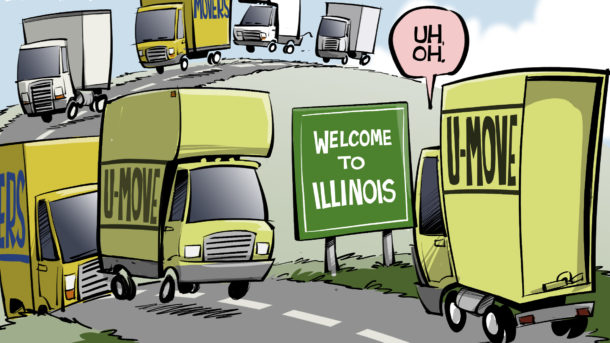Is This Any Way to Run a City’s Schools?
Leaked CTU Proposals Won’t Do Anything to Improve Schools’ Poor Performance

National Right to Work Determined to Clear the Air by This Fall
Since the first state Right to Work laws were passed, Big Labor has tried over and over — in Arizona, Nevada, Arkansas, Idaho, and most recently South Dakota — to use ballot measures to reinstitute compulsory union dues after a comprehensive state ban on them had already been adopted.
The union bosses have failed every time.
But currently they are trying again in Missouri, which adopted America’s 28th state Right to Work law less than a year ago.
Union strategists purport to be confident this time will be different, perhaps because in Missouri, unlike in every other state where a Right to Work repeal measure has come up for a public vote, the adopted “Show Me” State ban on forced union dues and fees has never taken effect.
Big Labor May Believe It Will Be Easier to Get Away With Lying in Missouri
“The overwhelming majority of Missourians have no direct experience living in a state where employees’ Right to Work is protected,” noted National Right to Work Committee Vice President Matthew Leen.
“And forced-unionism advocates may believe it will be easier for them to get away with lying about the economic impact of such protections in Missouri than it was in, for example, South Dakota, where in November 2016 voters quashed an anti-Right to Work ballot measure by an 80% to 20% margin.
“Missouri voters’ unfamiliarity with Right to Work laws, which prohibit the termination of private- and public-sector employees for refusal to bankroll an unwanted union, really does make the state a more challenging environment for opponents of Big Labor compulsion.
“But union propagandists are fooling themselves if they think it will be easy for them to demonize Right to Work in Missouri in 2018.”
Before they cast their votes this coming fall on the Big Labor measure that would strangle Right to Work in the cradle, Mr. Leen continued, “Missourians from every part of the state and all walks of life will have been furnished with the information they need to see through the union bosses’ smokescreen.
“Generous Committee members and supporters nationwide deserve a large part of the credit.
“Thanks to them, the Committee is already investing ample amounts of time, money and talent into helping Missouri citizens become better informed about Right to Work states’ economic track record as well as the moral injustice of forced unionism.”
Right to Work Real Factory Pay $4100 Higher Than In Forced-Dues States
“One fact that Big Labor propaganda brushes over,” said Mr. Leen, “is the substantial cost-of-living advantage Right to Work states as a group enjoy over forced-unionism states as a group.
“Data calculated and published by the Missouri Economic Research and Information Center, a state government agency, show that, in 2016, forced-unionism states (then 24 in number) were on average 25.6% more expensive to live in than Right to Work states.
“And when U.S. Commerce Department data are adjusted for interstate differences in the cost of living, they show that in 2016 the average compensation per factory worker was roughly $4100 higher in Right to Work states than in forced-unionism states.
“Moreover, real Right to Work factory compensation per employee in 2016 was roughly $2000 more than the average for Missouri, which was then still a forced-unionism state.”
Forced-Unionism Illinois Nears ‘a Death Spiral’
Another problem for the union hierarchy’s campaign to regain its coercive privileges in Missouri is that, among the eight neighbors surrounding the “Show Me” State, only Illinois is forced-unionism today.
And Illinois is, as renowned pundit George Will showed in a November syndicated column, “approaching a death spiral”:
“[D]eparting people and businesses suppress growth; the legislature responds by raising taxes; the exodus accelerates.”
Mr. Leen commented: “To make their anti-Right to Work sales pitch in Missouri, union PR flacks either have to hope no one in Missouri notices the catastrophe unfolding in neighboring Illinois, or blithely claim the catastrophe has nothing to do with forced unionism. Either strategy will be hard to pull off.”

Leaked CTU Proposals Won’t Do Anything to Improve Schools’ Poor Performance

Wherever Big Labor wields the power to collect forced union dues, union bosses funnel a large share of the confiscated money into efforts to elect and reelect business-bashing politicians. Employment growth tends to lag as a consequence.

Members Insist They Keep Pro-Right to Work Campaign Promises